if引导的条件状语从句58918
if引导的条件状语从句
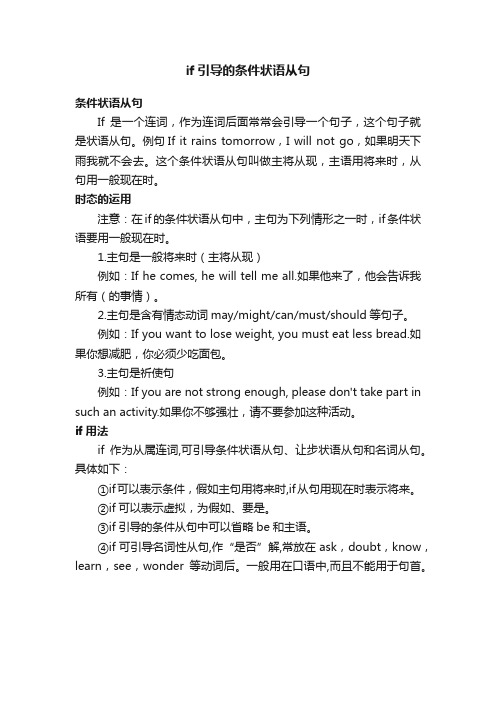
if引导的条件状语从句
条件状语从句
If是一个连词,作为连词后面常常会引导一个句子,这个句子就是状语从句。
例句If it rains tomorrow,I will not go,如果明天下雨我就不会去。
这个条件状语从句叫做主将从现,主语用将来时,从句用一般现在时。
时态的运用
注意:在if的条件状语从句中,主句为下列情形之一时,if条件状语要用一般现在时。
1.主句是一般将来时(主将从现)
例如:If he comes, he will tell me all.如果他来了,他会告诉我所有(的事情)。
2.主句是含有情态动词may/might/can/must/should等句子。
例如:If you want to lose weight, you must eat less bread.如果你想减肥,你必须少吃面包。
3.主句是祈使句
例如:If you are not strong enough, please don't take part in such an activity.如果你不够强壮,请不要参加这种活动。
if用法
if作为从属连词,可引导条件状语从句、让步状语从句和名词从句。
具体如下:
①if可以表示条件,假如主句用将来时,if从句用现在时表示将来。
②if可以表示虚拟,为假如、要是。
③if引导的条件从句中可以省略be和主语。
④if可引导名词性从句,作“是否”解,常放在ask,doubt,know,learn,see,wonder等动词后。
一般用在口语中,而且不能用于句首。
If-引导的条件状语从句
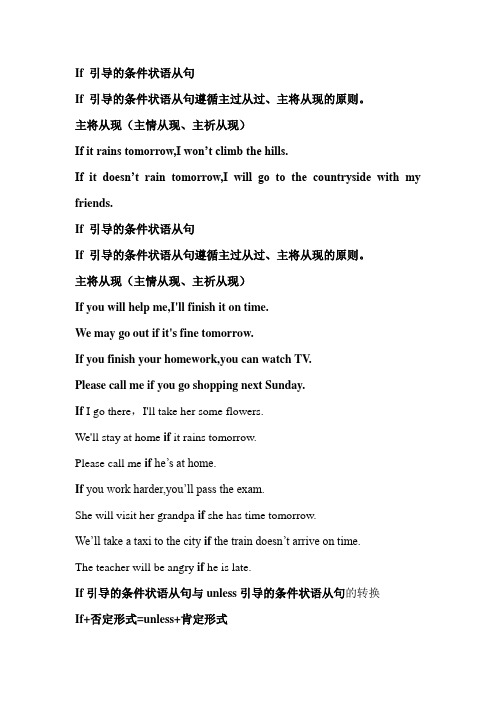
If 引导的条件状语从句If 引导的条件状语从句遵循主过从过、主将从现的原则。
主将从现(主情从现、主祈从现)If it rains tomorrow,I won’t climb the hills.If it doesn’t rain tomorrow,I will go to the countryside with my friends.If 引导的条件状语从句If 引导的条件状语从句遵循主过从过、主将从现的原则。
主将从现(主情从现、主祈从现)If you will help me,I'll finish it on time.We may go out if it's fine tomorrow.If you finish your homework,you can watch TV.Please call me if you go shopping next Sunday.If I go there,I'll take her some flowers.We'll stay at home if it rains tomorrow.Please call me if he’s at home.If you work harder,you’ll pass the exam.She will visit her grandpa if she has time tomorrow.We’ll take a taxi to the city if the train doesn’t arrive on time.The teacher will be angry if he is late.If引导的条件状语从句与unless引导的条件状语从句的转换If+否定形式=unless+肯定形式You won’t pass the exam if you don’t work hard.=You won’t pass the exam unless you work hard.If you don’t go to bed earlier,you will feel tired in the morning. =Unless you go to bed earlier,you will feel tired in the morning. If it doesn’t rain,he will play with me tomorrow.=Unless it rains,he will play with me tomorrow.If she doesn’t come,I’ll go shopping alone=Unless she comes,I’ll go shopping alone.if条件状语从句与祈使句,and/or+一般将来时的句子转化If you get up early,you’ll get there on time.=Get up early,and you’ll get there on time.=Get up early,or you won’t get there on time.If you get up early,you won't be late for school.=Get up early,and you won't be late for school.=Get up early,or you will be late for school.If you don’t get up early,you won’t catch up with the early bus. =Get up early,and you will catch up with the early bus.=Get up early,or you won’t catch up with the early bus.if条件状语从句与without的句子转化If there is no water,we can't live.=We can't live without water.If there is no water,fish will die.=Fish will die without water.If you help me,I’l l finish the work soon.=With your help,I finish the work soon.if条件状语从句与祈使句,and/or+一般将来时的句子转化If you get up early,you’ll get there on time.=Get up early,and you’ll get there on time.=Get up early,or you won’t get there on time.If you get up early,you won't be late for school.=Get up early,and you won't be late for school.=Get up early,or you will be late for school.If you don’t get up early,you won’t catch up with the early bus.=Get up early,and you will catch up with the early bus.=Get up early,or you won’t catch up with the early bus.1. your friend ,I'll tell you.eB.will comeesD.are coming2. If you go to college,you a good education.A.will getB.getC.getsD.got3.I want to know if they tomorrow.eB.will come C comes D.came4.Take enough exercise, you'll be in good heath.A.orB.soC.butD.and5.If it (not rain),he (play)basketball withme tomorrow.6.If Uncle Lan ______(come),I______(call)you up.7.She must see a dentist if she______(have)a toothache.8.Please wake me up if he______(come)back.9.Hurry up!Or you ______(be)late again.10.If you don’t be quick,you(be)late.1.We won’t wait for you you can’t arrive on time.A.untilB.whenC.afterD.if2.The children will go to the zoo if it (not rain)this Saturday.3.If she work hard,she be able to go to colleage.A.not,notB.won’t,won’tC.won’t,doesn’tD.dpesn’t,won’t4.If I run every day,I (be)healthier.5.If it (not rain),he (play)with me tomorrow.6.She must see a dentist if she (have)a toothache.7.Study hard,or you (not pass)the test.8.If you (not go)to bed earlier,you will feel tired in the morning.9.If he (be)free tomorrow,he will come to your birthday party.10.We will go to the zoo if it (not snow)tomorrow.。
If 引导的条件状语从句

If 引导的条件状语从句If引导的条件状语从句需要遵循主过从过、主将从现的原则。
例如,如果明天下雨,我就不会去爬山。
如果明天不下雨,我就会和朋友去乡村。
如果你帮我,我就能按时完成。
如果明天天气好,我们可能会出去。
如果你完成了作业,你就可以看电视。
如果你下周日去购物,请给我打电话。
如果我去那里,我会给她带些花。
如果明天下雨,我们会待在家里。
如果他在家,请给我打电话。
如果你更加努力,你就能通过考试。
如果她明天有时间,她会去看望她的爷爷。
如果火车没有准时到达,我们会坐出租车去市区。
如果老师迟到了,他会生气。
除此之外,如果否定形式的if可以转换成肯定形式的unless,例如你如果不努力,你就不能通过考试,可以转换成你除非努力,否则你就不能通过考试。
With your help。
I will be ___.If you wake up early。
you will arrive on time.Wake up early。
or you will be late.If you wake up early。
you won't be late for school.Wake up early。
and you will catch the early bus.1.I will tell you about your friend.Answer: A。
come2.If you go to college。
you will get a good ___. Answer: A。
will get3.I want to know if they will come tomorrow. Answer: B。
will come4.___ exercise。
and you'll be in good health. Answer: D。
and5.If it doesn't rain。
he will play ___.Answer: If it doesn't rain。
if 引导条件状语从句

if 引导条件状语从句【最新版】目录1.条件状语从句的定义和作用2.if 引导条件状语从句的用法3.实例分析4.注意事项正文一、条件状语从句的定义和作用条件状语从句是表示某种条件成立时,主句所表达的内容才会实现的从句。
它通常由连词 if 引导,用来表示在某种条件下,主句所述情况是否成立。
条件状语从句在英语中十分常见,具有很强的实用性。
二、if 引导条件状语从句的用法if 引导条件状语从句时,主句通常使用一般将来时,而从句则使用一般现在时。
这种时态搭配是为了表示在某种条件下,将来会发生的事情。
当然,在某些特殊情况下,也可以使用其他时态,例如主句使用一般现在时,从句使用一般将来时。
三、实例分析1.如果明天不下雨,我们会去公园。
(If it doesn"t rain tomorrow, we will go to the park.)在这个例子中,从句“it doesn"t rain tomorrow”表示一种条件,即明天不下雨,主句“we will go to the park”表示在这种条件下会发生的事情,即我们去公园。
2.如果你愿意,我们可以一起去看电影。
(If you are willing, we cango to the movies together.)在这个例子中,从句“you are willing”表示一种条件,即你愿意,主句“we can go to the movies together”表示在这种条件下会发生的事情,即我们一起去看电影。
四、注意事项在使用 if 引导条件状语从句时,需要注意以下几点:1.条件状语从句中的 if 通常可以翻译为“如果”,但有时也可以翻译为“是否”或“是不是”,具体翻译需要根据上下文判断。
2.条件状语从句中的时态搭配要正确,通常为主句一般将来时,从句一般现在时。
3.条件状语从句有时可以省略 if,直接用主句和从句连接,例如:It will be fine if it doesn"t rain.(如果下雨,天气就不会好了。
if引导的条件状语从句
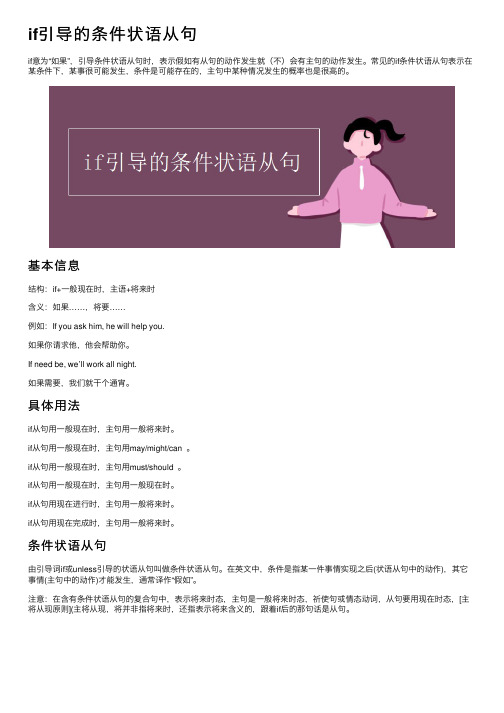
if引导的条件状语从句
if意为“如果”,引导条件状语从句时,表⽰假如有从句的动作发⽣就(不)会有主句的动作发⽣。
常见的if条件状语从句表⽰在某条件下,某事很可能发⽣,条件是可能存在的,主句中某种情况发⽣的概率也是很⾼的。
基本信息
结构:if+⼀般现在时,主语+将来时
含义:如果……,将要……
例如:If you ask him, he will help you.
如果你请求他,他会帮助你。
If need be, we’ll work all night.
如果需要,我们就⼲个通宵。
具体⽤法
if从句⽤⼀般现在时,主句⽤⼀般将来时。
if从句⽤⼀般现在时,主句⽤may/might/can 。
if从句⽤⼀般现在时,主句⽤must/should 。
if从句⽤⼀般现在时,主句⽤⼀般现在时。
if从句⽤现在进⾏时,主句⽤⼀般将来时。
if从句⽤现在完成时,主句⽤⼀般将来时。
条件状语从句
由引导词if或unless引导的状语从句叫做条件状语从句。
在英⽂中,条件是指某⼀件事情实现之后(状语从句中的动作),其它事情(主句中的动作)才能发⽣,通常译作“假如”。
注意:在含有条件状语从句的复合句中,表⽰将来时态,主句是⼀般将来时态,祈使句或情态动词,从句要⽤现在时态,[主将从现原则](主将从现,将并⾮指将来时,还指表⽰将来含义的,跟着if后的那句话是从句。
if引导的条件状语从句总结(精)
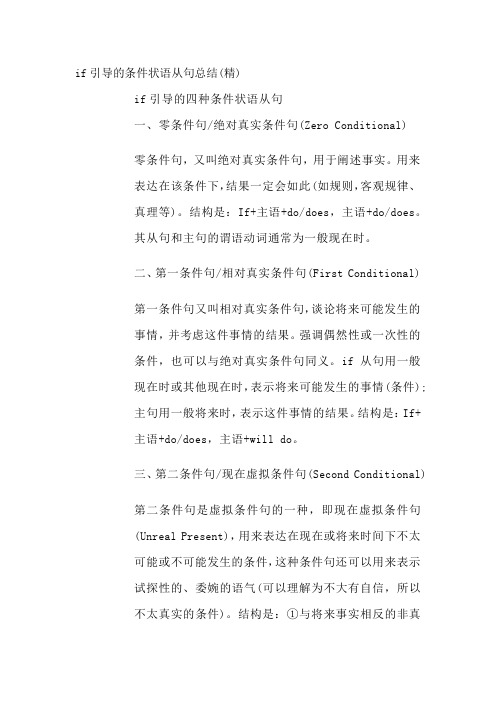
if引导的条件状语从句总结(精)if引导的四种条件状语从句一、零条件句/绝对真实条件句(Zero Conditional)零条件句,又叫绝对真实条件句,用于阐述事实。
用来表达在该条件下,结果一定会如此(如规则,客观规律、真理等)。
结构是:If+主语+do/does,主语+do/does。
其从句和主句的谓语动词通常为一般现在时。
二、第一条件句/相对真实条件句(First Conditional)第一条件句又叫相对真实条件句,谈论将来可能发生的事情,并考虑这件事情的结果。
强调偶然性或一次性的条件,也可以与绝对真实条件句同义。
if从句用一般现在时或其他现在时,表示将来可能发生的事情(条件);主句用一般将来时,表示这件事情的结果。
结构是:If+主语+do/does,主语+will do。
三、第二条件句/现在虚拟条件句(Second Conditional)第二条件句是虚拟条件句的一种,即现在虚拟条件句(Unreal Present),用来表达在现在或将来时间下不太可能或不可能发生的条件,这种条件句还可以用来表示试探性的、委婉的语气(可以理解为不大有自信,所以不太真实的条件)。
结构是:①与将来事实相反的非真实条件句是If+主语+should do/were to do/did,主语+would/should/could/might do;②与现在事实相反的非真实条件句是If+主语+did,主语+would/should/could/might+do。
四、第三条件句/过去虚拟条件句(Third Conditional) 第三条件句是表示与过去事实相反的虚拟语气,是用来表达如果(If)当时那样发生,另外一方面(当时)结果会如何。
通常是指过去的事情,带有一切已经太迟而不能够补救的意思。
结构是:If+主语+had done,主语+would/should/could/ might+have done。
if 条件句的时态搭配1.if从句用一般现在时,主句用一般将来时2.if从句用一般现在时,主句用may/might/canIf the fog gets thicker the plane may/might be diverted.3.if从句用一般现在时,主句用must/shouldIf you want to lose weight you must/should eat less bread.4.if从句用一般现在时,主句用一般现在时5.if从句用现在进行时,主句用一般将来时6.if从句用现在完成时,主句用一般将来时If you have finished dinner I’ll ask the waiter for the bill.。
If引导的条件状语从句

1.If you __C___ to the party, you’ll have a great time.
A. will go B. went C. go D. going 2. I __D__ her the answer if she ____me.
A.can tell, will ask B. will tell, will ask C. would tell, ask D. will tell, asks
11. If you ___a_re_____(be) happy , we will be happy .
12. If she translates (translate ) the sentence word by word , she __w_il_l _g_e_t_(get ) its true meaning .
2 If I ___c_o_p_y____(copy ) your homework , I will cheat myself .
3 If she ___d_o_e_s_n_’t_g_e_t____(not get ) up early , she’ll miss the early bus .
4 If your mother___b_u_ys__ (buy) the book for you , it will be good for your study.
• 例如: If you have any questions to ask, please come to my office. 如果你有问题要问的 话,请到我办公室来。
1. if 在句中的含义不同 I want to know if he is a teacher.
if引导的条件状语从句
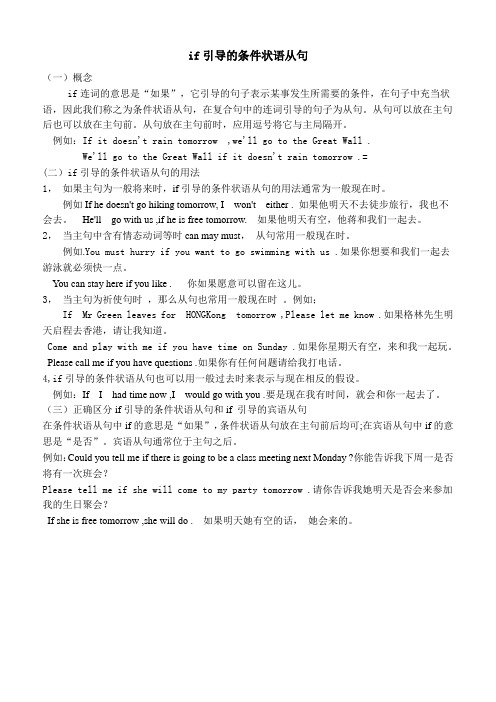
if引导的条件状语从句(一)概念if连词的意思是“如果”,它引导的句子表示某事发生所需要的条件,在句子中充当状语,因此我们称之为条件状语从句,在复合句中的连词引导的句子为从句。
从句可以放在主句后也可以放在主句前。
从句放在主句前时,应用逗号将它与主局隔开。
例如:If it doesn't rain tomorrow ,we'll go to the Great Wall .We'll go to the Great Wall if it doesn't rain tomorrow .=(二)if引导的条件状语从句的用法1,如果主句为一般将来时,if引导的条件状语从句的用法通常为一般现在时。
例如If he doesn't go hiking tomorrow, I won't either . 如果他明天不去徒步旅行,我也不会去。
He'll go with us ,if he is free tomorrow. 如果他明天有空,他蒋和我们一起去。
2,当主句中含有情态动词等时can may must,从句常用一般现在时。
例如.You must hurry if you want to go swimming with us .如果你想要和我们一起去游泳就必须快一点。
You can stay here if you like . 你如果愿意可以留在这儿。
3,当主句为祈使句时,那么从句也常用一般现在时。
例如;If Mr Green leaves for HONGKong tomorrow ,Please let me know .如果格林先生明天启程去香港,请让我知道。
Come and play with me if you have time on Sunday .如果你星期天有空,来和我一起玩。
Please call me if you have questions .如果你有任何问题请给我打电话。
- 1、下载文档前请自行甄别文档内容的完整性,平台不提供额外的编辑、内容补充、找答案等附加服务。
- 2、"仅部分预览"的文档,不可在线预览部分如存在完整性等问题,可反馈申请退款(可完整预览的文档不适用该条件!)。
- 3、如文档侵犯您的权益,请联系客服反馈,我们会尽快为您处理(人工客服工作时间:9:00-18:30)。
Don’t jump into the river if you feel very hot.如果你感到很热,不要跳入河里。
④主句为过去将来时,if从句用一般过去时态(如果涉及到be动词,一律都用were)。此时,表达的是和现实相反的推测,用虚拟语气。
If I were you, I wouldn’t do it like that.
if引导的条件状语从句
用法
例句
①主句为一般将来时态,if从句用一般
现在时态(即主将从现)。
We will stay at home if it rains tomorrow.
如果明天下雨,我将要呆在家。
②主句中含有情态动词,if从句用一般现在时态。
If you finish your homework, ห้องสมุดไป่ตู้ou can go home now.如果你做完了作业,你现在可以回家了。
2. If it ________(not snow)tomorrow, we will feel unhappy.
3. You mustn’t go to school if you ________(be)still in bed.
4. If he _______(be)at home at that time, he would know it.
5. Please show me the way if you ________(know)it.
6. You will hurt your teeth if you ________(eat)too much candy.
7. If you gave me a toy car, I _________(be)very happy.
8. I would get the prize if I _________(work)hard.
如果我是你,我就不会那么做的。
If you gave me some money, I would be very happy.如果你给我一些钱,我就会很高兴的。
【边学边做】用括号内所给词的正确形式填空。
1. What will you buy if you ________(have)a lot of money
